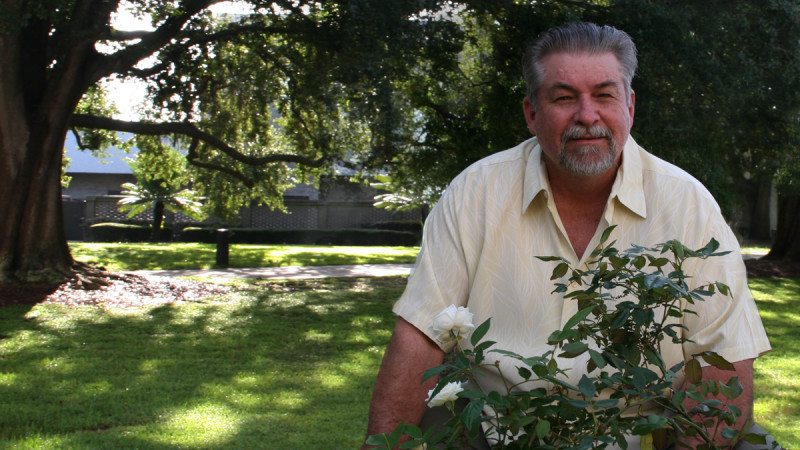Hidden Talents: Athletic Director Bing Tyus Grows His Love for Landscaping

Polk State Athletic Director Bing Tyus is also a successful gardener. Here, he shows off two rose bushes he grew from clippings off other bushes in his yard.
As Polk State’s longtime Athletic Director, Bing Tyus is known to many as “the sports guy.”
And yes, he can rattle off all sorts of sports facts and stats, memories and minutiae.
Spend a little time with him off the field or court, however, and you just may get a glimpse into another of his passions — gardening.
It’s an interest that, disconnected as it is to his daily job, actually has its roots in his work at Polk State.
Tyus first came to work at Polk in 1983, as head baseball coach. At the time, the coach’s job duties included tending for the playing field — sodding, fertilizing, mowing, watering, the whole shebang.
“I had to beg and borrow for equipment and fertilizer. It was just me and a couple of assistant coaches for years, working on the field,” he said.
Tyus had spent much of his childhood on his grandparents’ Panhandle farm, planting peanuts, soybeans and cotton. But tending to the baseball field was his first foray into landscaping — and he loved it.
With Tyus’ care, the field grew green and lush, thick and inviting. One day, his wife, Polk State Senior Administrative Assistant Debbie Tyus, said to him: “I want my yard to look like your yard.”
Tyus, always the eager-to-please husband, he says with a grin, heeded Debbie’s words, and in 1992 — yes, he remembers the exact year — he bought his first rose bush from a Plant City antique store.
He went home, put it in the ground, and it flourished.
From that one bush, his interest in gardening grew, and now his yard in Lake Wales blooms all year, full of crepe myrtles, orchids, tabebuias, cacti — and, of course, his roses.
Through the years, he’s created the beautiful landscape his wife wanted, but also found a source of peace, one he thinks most people would enjoy, too, if they would give it a try.
“For me, gardening is solace. It’s very gratifying to put a plant in the ground and step outside your house every day, and smell it and watch it grow,” he said.
Here, Tyus shares his tips for all the novice gardeners out there who want to spruce up their yards — and maybe get a bit of that inner peace, too.
Know Your Yard
The first thing you have to do, but that a lot of people don’t do, is really think about your yard. How much sunlight do you get and in what parts of the yard? Do you have an irrigation system? If not, how much time — and money — do you want to spend to water your plants? In addition to knowing your yard, you also really should take the time to develop a relationship with the people at your nursery, hardware store or wherever you’re going to buy the plants. They have all kinds of knowledge that can help you, but you have to ask first.
Start Small
A lot of people try to do too much at once, and they end up spending lots of money on plants that don’t work out. I know because I’ve done it myself. Pick a small section of your yard and start there. If that works out, move on to the next. You can make a big impact with very limited time and resources. Speaking of time, it’s important to think about your lifestyle when landscaping, too. If you work and have a family, you’re not going to have the time to care for high-maintenance plants.
Get Plants that Can Stand the Test
It’s important to choose plants that are hardy — that can stand cold, drought, and insects. I’ve had great success with old roses — which are disease resistant, easy to grow, and hardy in all kinds of conditions. I have old roses all around my house; they do well in the sun and in the shade. Old roses can be hard to find, but worth asking for at your local nursery because they’re easy and have beautiful color. I have two favorite varieties: Louis Philippe and Seven Sisters. Also, crepe myrtles and magnolias do really well with very little upkeep. I also have cacti in my yard and they produce some of the most beautiful flowers I’ve ever seen — with no water at all.
Think About the Future
Just because you’re planting in the late spring or summer doesn’t mean you shouldn’t be thinking ahead to the winter. Think about not only how the plants you choose are going to handle the change in seasons, but also think about when certain plants bloom. Crepe myrtles are beautiful in the summer and tabebuias are beautiful in the winter. If you take the time to plan, you can have a beautiful blooming yard all year long.
Polk State College is full of examples of students and employees who possess hidden talents, who defy what others might assume about them by excelling in unexpected interests. There’s the athletic director who’s also a gardening enthusiast, the human resources assistant who’s also a basket-weaver, the researcher who’s also a self-described “foodie,” and countless other examples. Hidden Talents is a regular feature that highlights this immense diversity within the College. Send your suggestions for Hidden Talents features to news@polk.edu.

